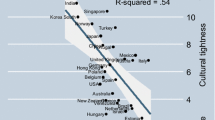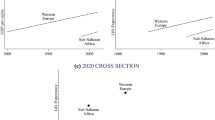Abstract
One of the most significant developments in the latter part of the 20th century and the first part of this new millennium has been the triumph of short-term over long-term thinking. We are increasingly a culture that looks neither to the past nor to the future, but only to the next “quarter,” or to the next Delphic pronouncement by Alan Greenspan. This cultural construction of time has given rise to social, political and personal problems of unprecedented magnitude. The short-term focus of contemporary American capitalism is causing us to behave, both individually and collectively, in an increasingly irrational and thus self-destructive manner. Ours is now the most violent, crime-ridden society in the industrialized world. Capitalism is sometimes blamed for this, yet there are other capitalist societies that do not suffer the same evils we suffer. I argue that we can learn from these societies how to correct some of the ills of our own system and in this way construct a new paradigm of the market, a paradigm for the new millennium, a more mature, rational version of capitalism that would focus on the long rather than the short term.
Similar content being viewed by others
References
Albert, M.: 1991, Capitalism Against Capitalism, Paul Haviland (tran.) (Whurr, London, 1993).
Bech, U.: 1992, Risk Society, trans. Mark Ritter (Sage, London).
Breton, D. and C. Largent: 1991, The Soul of Economics (Idea House Publishing Company, Wilmington, Delaware).
Budtz, L.: 1996, Amerika: Drøm eller mareridt? (America: Dream or Nightmare?) (Fremad, Copenhagen).
Bureau of Labor Statistics, United States Department of Labor: 2001, ‘International Comparison of Hourly Compensation Costs for Production Workers in Manufacturing 1975–2000, Supplementary Tables for Bureau of Labor Statistics,’ (Washington, DC), News release, September 25, 2001.
Bury, J. B.: 1955, The Idea of Progress (Dover Publications, Inc., New York).
Børsting, H.: 2001, ‘LO åben for job reformer’ (LO Receptive to Job Reforms), Berlingske Tiderne, 21 March.
Coleman, J. W.: 1989, The Criminal Elite (St Martin's Press, New York).
The Economist: 2002, ‘Too Many Convicts,’ August 10.
Feagin, J. R.: 1975, Subordinating the Poor: Welfare and American Beliefs (Prentice Hall, Englewood Cliffs, NJ).
The Federation of European Employers: 2001, Pay in Europe 2001: Remuneration Policy and Practice (Surrey, UK).
Flores, F. and J. Gray: 2000, Entrepreneurs hip and the Wired Life: Work in the Wake of Careers (Demos, London).
Goethe, J. W.: (1825?), ‘Den Vereinigten Staaten,’ in K. Eibl (ed.), Goethe Såmtliche Werker, Gedichte, Vol. 2 (Deutsche Klassiker Verlag, Frankfurt am Main), p. 739.
Hansen, M. B.: 2001, ‘40 procent rammes at topskat’ (40 Percent Now in Top Tax Bracket), Berlingske Tiderne, 25 March.
Head, S.: 1996, ‘The New Ruthless Economy,’ New York Review of Books, February 29.
Herman, E. S.: 1995, The Triumph of the Market: Essays on Economics, Politics and the Media (South End Press, Boston).
Hochschild, A.: 1997, The Time Bind: When Work Becomes Home and Home Becomes Work (Henry Holt & Company, New York).
Hobbes, T.: 1642, in Sir W. Molesworth (ed.), De Cive, The English Works of Thomas Hobbes, 11 Vols (London, 1839–45).
Hobbes, T.: 1651, in Sir W. Molesworth (ed.) Leviathan, The English Works of Thomas Hobbes, 11 Vols (London, 1839–45).
International Labor Organization: 1999, ‘Key Indicators of the Labor Market 1999’ (Geneva, Switzerland).
Johannesen, R. L.: 2002, Ethics in Human Communication (Waveland, Prospect Heights, Illinois).
Kierkegaard, S.: 1846, Concluding Unscientific Postscript, trans. David F. Swenson and Walter Lowrie (Princeton University Press, Princeton, 1941).
Korton, D. C.: 1999, The Post Corporate World: Life After Capitalism (Berrett-Koehler Publishers and Kumarian Press, San Francisco, California and West Hartford, Connecticut).
Krugman, P.: 1992, ‘The Right, The Rich and the Facts,’ American Prospect 11 (Fall).
Lewis, M.: 1992, The Money Culture (Penguin Books, New York).
Marshal, R. and M. Tucker: 1992, Thinking for a Living: Education and the Wealth of Nations (Harper Collins, New York).
Mokhiber, R. and P. Weissman: 1999, Corporate Predators: The Hunt for Mega-Profits and the Attack on Democracy (Common Courage Press, Monroe, ME).
Peterson, P. G.: 1993, Facing Up: Paying Our Nation's Debt and Saving Our Children's Future (Simon and Schuster, New York).
Pryor, F. L.: 2002, The Future of U.S. Capitalism (Cambridge University Press, Cambridge).
Reich, R.: 2000, The Future of Success (Random House, New York).
Sampson, A.: 1995, Company Man (Random House, New York).
Sante, L.: 1996, ‘American Photography's Golden Age,’ The New York Review of Books, April 4.
Schor, J. B.: 1991, The Overworked American: The Unexpected Decline of Leisure (Basic Books, New York).
Schur, E. M.: 1969, Our Criminal Society: The Social and Legal Sources of Crime in America (Prentice-Hall, Englewood Cliffs, NJ).
Sennett, R.: 1998, The Corrosion of Character: The Personal Consequences of Work in the New Capitalism (W.W. Norton & Company, New York).
Shapiro, A.: 1992, We're Number One!: Where America Stands and Falls Inside the New World Order (Random House, New York).
Solomon, R.: 1993, Ethics and Excellence: Cooperation and Integrity in Business (Oxford University Press, Oxford).
Sutherland, E. H.: 1949, White Collar Crime (Dryden Press, New York).
Tikkun: A Bimonthly Jewish Critique of Politics, Religion and Culture: 2002, ‘The Tikkun Community,’: 2002 (Institute for Labor and Mental Health, San Francisco, CA).
United States Census Bureau: 2000, ‘Income, Expenditures and Wealth,’ in U.S. Census Bureau Statistical Abstract of the United Sates (Washington, DC).
United States Department of Labor: 1999, Report on the American Workforce (Washington, DC).
Weber, M.: 1920–21, The Protestant Ethic and the Spirit of Capitalism (tran.) Talcott Parsons (Routledge, London, 2001).
Willis, G.: 2000, ‘The Stock that Ate Cincinnati,’ in Andrew Leckey and Marshall Loeb (eds.), The Best Business Stones of the Year 2001 Edition (Random House, New York), pp. 3–12.
World Health Organization: 2000, ‘Annex Table 2 Basic Indicators for All Member States,’ in World Health Report 2000 (Geneva, Switzerland).
Author information
Authors and Affiliations
Rights and permissions
About this article
Cite this article
Piety, M. The Long Term: Capitalism and Culture in the New Millennium. Journal of Business Ethics 51, 103–118 (2004). https://doi.org/10.1023/B:BUSI.0000033605.51733.92
Issue Date:
DOI: https://doi.org/10.1023/B:BUSI.0000033605.51733.92




